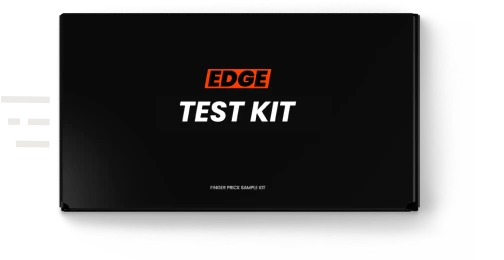
Athletics
Blood Profiling: 6 Reasons Athletes Should Get Their Blood Tested
Blood testing and profiling used to be associated primarily with illicit activities such as doping, or as a diagnostic technique used by doctors to determine the cause of illness or fatigue.
1 min read
Published on
October 30, 2020
Written by
EDGE
Share this article
These days, the science and technology available means that blood tests can be done simply with a finger prick sample technique, analysed quickly to a high degree of accuracy, and made available swiftly.
Since blood profiling is the best way to get insight into an athlete’s health and performance, it’s little wonder that the advent of greater accessibility to scientific expertise has seen increasing numbers of athletes use it to get a much deeper understanding of how their body works, what it needs, and how to keep it healthy.
Here are our top 6 reasons why blood profiling can help athletes achieve incremental improvements in performance.
1. CHECK YOU’RE GETTING THE RIGHT NUTRITION
Multiple vitamins and minerals are necessary for the biochemical processes that control metabolism, bone growth, muscle action, and much more, and the best way to get these is through the food you eat. It’s important to ensure that you’re not only getting enough food but also the right food with a variety of fruit, vegetables, carbohydrates, and protein sources to fulfill those nutrient requirements.
Nutrient deficiencies can manifest in various ways, like general feelings of fatigue, a drop in mood or motivation, susceptibility to illness, or a reduction in power output. But since any one of these could be caused by low levels of a range of nutrients, it’s hard to pinpoint quickly whether symptoms are because of a deficiency, or some other underlying cause like illness or infection.
Blood tests are an ideal way to get a quick snapshot of your nutrient profile, and the Edge app display allows you to see how your levels compare not only to the recommended range for your gender and age but also to other similar Edge users.
Once you’ve identified any nutrients you’re low in, you can take steps to add these to your diet either through changes to the food you eat or using supplements. The Edge sports science team provides helpful advice tailored to your individual results to help guide you, for example by recommending foods that can help you achieve your nutrient needs.
2. HELP YOU BALANCE TRAINING AND RECOVERY
It’s tempting to think that to improve your performance you need to train, train, train. And while training is certainly critical to improving your performance, it’s easy to overlook the importance of rest.
Rest doesn’t just give your body a break from the stress that training places on it, it’s also a key part of the process of improvement. It’s while you’re at rest that your body does the actual work of building muscle, strengthening bone, and increasing aerobic capacity. Without sufficient rest, you won’t get anything like the optimum level of benefits from your training.
Overtraining can be identified by measuring the levels of certain biomarkers in the blood including the stress hormone cortisol and white blood cells. If levels of cortisol are high, that indicates the body is under stress because it’s not getting enough time to recover. If levels of white blood cells are high, it can indicate that this stress is enough that the body doesn’t have the energy to fuel the immune system properly.
3. ENSURE YOU RECOVER BETTER FROM INJURY OR ILLNESS
Getting injured or falling ill can be incredibly frustrating for athletes. When you’re used to being active and healthy, enforced rest is at best boring, and it can be tempting to ramp up the training before you’re fully recovered or train harder than you should in an attempt to ‘make up for lost time.’
But go too hard or too soon, and you risk setting back your recovery and compromising your performance.
If you’re unsure if you’re fully recovered from an illness, infection, or injury, a blood test can give you a clearer picture of what’s going on inside. Is that feeling of weakness because you’re still ill or because you’ve not been able to train for a few weeks? A few drops of blood and some expert analysis provides the answer and will give you the confidence you need to get your training back on track without risking your health.
Read Eloise du Luart’s blog on tips for recovery.
4. TRACK YOUR PROGRESS
A single test gives you a snapshot of your health, but repeated testing over the course of a season, a year or more allows you to track how your health and fitness progresses over time.
You can see how changes in diet and training affects your body, address issues like nutritional deficits before they become a problem, and even recognise when you need more rest and recovery time after big events.
As any athlete knows, it’s incredibly motivating and confidence-inspiring to watch your numbers improve as you train, whether that’s power output, speed, time, cadence, weight, or more.
It’s the same with blood profiling; it gives you a deeper level of insight into your own performance, how it’s progressing and evolving and how those changes you are making externally are building a better athlete from the inside out.
5. UNDERSTAND YOUR OWN BODY BETTER
Another benefit of repeat testing is that it builds up a much more accurate picture of your own unique biomarker levels.
Each individual is different, so while there are guideline ranges for biomarkers, there will be subtle variations from person to person. With repeated testing, you can build up your own personal profile, and determine your individual Critical Difference Threshold (CDT) which will let you know whether a change in your biomarker results is significant, and how significant it is.
In competitive sports, a subtle variation can mean the difference between performing well and performing at your very best; the difference between a top result and an okay one. The better you know yourself, your body and what it needs to perform to it’s best, the better your performance will be.
6. GET EXPERT ADVICE
Not all blood tests are created equal. A blood test is only as good as the expertise behind it, and at Edge, that expertise includes NHS accredited labs and a cutting edge app interface for accessing results.
But the jewels in the crown, the element that makes Edge ideal for athletes, is the team of highly respected sports scientists behind it.
Heading up the team is Dr. Nicky Keay, an endocrinologist with numerous published scientific research papers into the impact of training and nutrition on the hormones and health of athletes. Renee McGregor is likewise a published nutrition expert and medically qualified dietitian, who has advised Olympic, Paralympic, and Commonwealth teams. Dr. Michael Cornes is a clinical scientist with the NHS, and has helped develop the testing protocol that Edge uses, ensuring samples are processed to the highest accuracy possible, as well as determining healthy biomarker ranges.
Through Edge, athletes have access to their collective expertise, and they’ll provide tips and advice to help athletes interpret their results and improve their levels, and thereby their performance.
Blood test for
Cyclists
Male & Female Tests
sports doctor review
Results in 2 working days
Flexible subscription
Get 10% off your first order
Want regular tips on how to make the most of your results? Join our newsletter and we'll give you 10% off your order!
